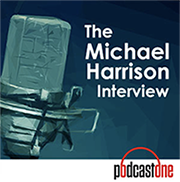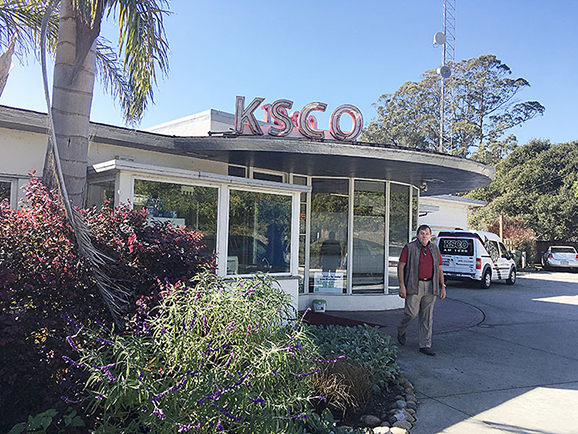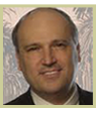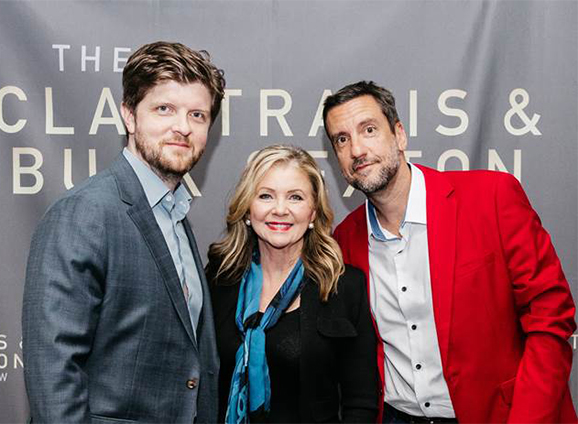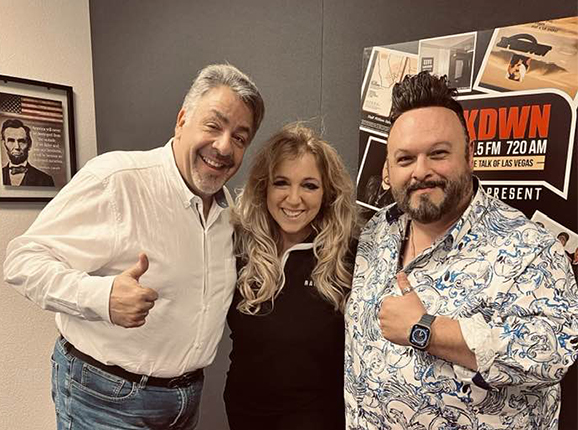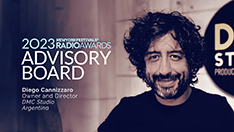By Mike Kinosian
TALKERS magazine
Managing Editor
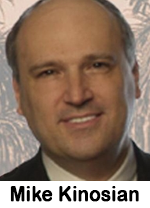 Notwithstanding the enormity of accomplishments that enveloped this exceptionally bright and learned broadcaster, Jerry Springer remained as humble and refreshingly an “ah shucks” individual as you’ll ever hope to meet.
Notwithstanding the enormity of accomplishments that enveloped this exceptionally bright and learned broadcaster, Jerry Springer remained as humble and refreshingly an “ah shucks” individual as you’ll ever hope to meet.
Perhaps that speaks to the somber circumstances that brought him to this country at the tender and innocent age of five.
It’s a borderline crime that many people think the Tulane University (B.A. in Political Science, 1965) and Northwestern University (1968 Law degree) graduate’s resume consisted solely of watching people verbally and physically beat each other to a pulp on a daily, hour-long television show that carried his name for 27 years, starting in September 1991.
It was only natural that this passionate political voice for domestic and international issues – who was a leader in lowering the voting age from 21 to 18 with the 1971 passage of the 26th Amendment – be offered a meaningful podium to air his views.
Many observers, though, were stunned when – in January 2005 – Springer actually agreed to weave a daily radio talk show into his already hectic media schedule.
Field of dreams leveled
Barely two weeks into Springer’s local run on Clear Channel Cincinnati flagship WCKY “The Revolution Of Talk Radio” and Clear Channel Detroit’s WDTW “Detroit’s Progressive Talk,” Air America Radio picked up his 9:00 am – 12:00 noon “Springer On The Radio” talkfest.
The experience had the resplendent one positively beaming. “Frankly, I’m just as excited as I can be,” he remarked to me. “Politics and public issues have always been my main interest. [It’s exciting] to have an opportunity to be part of the American conversation at a time when there is clearly a need for other points of view. Talk radio is overwhelmingly dominated by conservative ideas. There’s a place for that, of course, but we also need to hear other ideas and other points of view. Perhaps this is an area in which I can make a contribution.”
Off-and-on discussions had been held between Springer and Air America even before the network’s March 31, 2004 sign-on. The former Cincinnati Mayor, however, confided he wasn’t thoroughly convinced he was ready to commit to doing a daily radio show. “With this last presidential election, I realized that, until we level the playing field, there’s not going to be any hope of having a more progressive government,” Springer proclaimed. “That’s when it suddenly became a priority for me. I’ve only been on Air America [since January 2005], but the early ratings returns are great; apparently, we’re doing well.”
Life progresses
Every Top 10 market except No. 2 Los Angeles carried “Springer On The Radio” and the overall affiliate count quickly grew to 50 outlets. “Our biggest non-Air America Radio station is [Clear Channel Cleveland news/talk] WTAM,” he pointed out. “It’s a powerhouse station and the interesting thing there is that I lead into [Premiere Radio’s] Rush Limbaugh. In some markets, I lead into [Air America’s] Al Franken and in others, I lead into Rush – talk about whiplash.”
The majority of the American populace, of course, knew Springer as the 14-year host of a show that wasn’t much of a threat to win many Peabody awards.
Approximately 10 years prior to his national exposure, though, Springer was an anchor/political reporter/commentator on Cincinnati television, proudly notching seven Emmy Awards for his nightly commentaries. “I loved doing it and don’t have any bad memories, but I’m in a different point in my life now,” Cincinnati Magazine’s five-time “Best TV Anchor” recipient commented. “Life moves on and I’m onto something else and I’m not sure I’d go back to that anymore.”
Stone cold memories
Some would ascribe Chicago (the base of his TV show); New York; or Cincinnati as Springer’s birthplace. All would be incorrect, as he was born in London (1944) when his family successfully escaped the holocaust.
They arrived in New York City on January 24, 1949 and it is without any hesitation the usually glib Springer blurted out that particular date in reverence and sincere reflection. “I didn’t specifically go through Ellis Island,” he recounted in a markedly softer tone. “My parents and I had a five-day journey on the Queen Mary and I remember being called up on the top deck as we passed the Statue of Liberty. It didn’t mean that much to me, since I was just five years old and freezing cold. I do, however, remember being scared because I saw all those people huddled together. The other memory I have is that it was stone silent – nobody said a word.”
Radio’s role in the Americanization process
In later years, his mother (Margot) told her son that he’d asked her why everyone was looking at the Statue of Liberty and what it meant. “She said in the German that she spoke at the time that one day it will mean everything,” Springer recalled still touched with emotion. “She was right. My family went from holocaust to this ridiculously privileged life I live today in one generation, so I know the ‘American Dream’ can work.”
The first year he and his family were immigrants, Springer lived in Manhattan’s now defunct Whitehall Hotel near Amsterdam Avenue.
One year later, they moved to a rent-controlled apartment where his parents would live for the next 32 years. “Everyone was trying to learn English,” emphasized Springer, who established a scholarship fund at Chicago’s Kellman School that serves inner city youth. “I was five years old, but my parents wanted me to become Americanized so we listened to the radio all day. One of my earliest memories as a little boy was listening in the morning to [Roger] Gallagher & [Joe] O’Brien [on New York City’s WMCA]. Some of my Americanization – including the news, sports, idioms, music and sense of humor – came through the radio.”
Compelling dialogue
Utterly and genuinely masterful at what he’s accomplished on television, a low-key Springer modestly admitted he tried to learn a little something from certain radio personalities, without consciously copying anybody. “I just turn on the microphone and talk,” he stated with simplicity. “Obviously, Rush and [ABC Radio’s/Fox News Channel’s] Sean [Hannity] are at the top of the heap, simply because they’ve been doing it for so long. I think [Air America’s] Randi Rhodes is just wonderful on the radio and Al Franken has a great sense of timing.”
Many on the right claim liberal-leaning talkers have heretofore failed in our medium because they lack the entertainment factor. If anyone knew how to present an entertaining product, it was the extremely adept Springer who flatly asserted, “The conversation has to be interesting – period. That can be in the way it’s presented; the way we accept different callers; or with little skits we do. People must feel they have to listen, but it doesn’t have to be entertaining in the ‘ha-ha’ sense all the time. To be honest, not every conservative show is entertaining – some aren’t interesting at all.”
The question of whether a program holds one’s interest or has a significant entertainment quotient has virtually nothing to do with a particular political philosophy, but rather, as Springer explained whether the host is capable of putting on a good show. “The reality is conservatives took to radio 20 years ago when liberals weren’t looking at that as an economic marketplace. Someone figured out that conservatives could really find an audience in radio because you were dealing, at that time, with angry white men going to work. You get them when they’re driving to [their jobs]. Clearly, Rush filled a void and is a tremendous talent. When people saw that, the industry moved in that direction.”
The face of liberal America
Firmly contended that conservatives did well on radio in large part because the liberals won, Springer opined in my 2005 interview, “America is far more liberal today than it ever was. I know we elect conservatives from time to time, but clearly in terms of the critical issues of the day, no one could look at America and say we are not liberal. The protest came from the right.”
Conservatives though were in charge when he was growing up and dissent came from the left.
Protests were for such noble movements and causes as civil rights, anti-war, women’s rights and the environment. “Finally, the liberals won and their agenda is how most Americans live,” Springer contended. “Even if you call yourself a conservative, chances are your kids are listening to the same music, going to the same movies and wearing the same clothing. The culture is clearly more liberal than it ever was. We don’t even blink if we see interracial dating or interracial marriage; it’s not an issue. We’ve clearly moved to the left. Since America is now so liberal in terms of its everyday living, the protest is coming from the right.”
TV show proves to be a non-issue
That’s certainly more than a plausible reason to explain the widespread success enjoyed by conservative talk radio. “With the emergence of the Christian right or whatever in the last couple of years, liberals have been getting nervous again,” Springer speculated. “You’ll start to see the emergence of liberal radio. Radio will always be the response to what’s going on in society. People aren’t going to call up [talk shows] if they’re happy with everything; they’ll get on with their lives. People who call are the ones who are upset. That’s why you’ve seen this trend in radio from liberal to conservative back to liberal.”
Listener feedback to the engaging Springer was gratifying and, on at least one level, elicited a curious result. “We don’t get any calls – and I mean none – that comment on the [television show],” he stressed. “I sometimes wonder if they even know that it’s me or if they think I’m a guy with a similar name. From whatever side of the spectrum they’re from, no one seems to make reference to the television show. It’s a non-entity in terms of radio.”
Not a perfect fit
Those unaware of Springer’s legitimate political acumen could be caught off-guard by hearing him as the front person of an issue-charged talk program, but the host adamantly maintained, “Within 18 seconds of hearing the show, you’re going to realize it’s different. You may not agree with what I’m saying, but it’s impossible to listen [and not have an opinion].”
Commanding center stage approximately eighteen years ago were such topics as the war in Iraq; terrorist bombings in London; potential Supreme Court nominees; Social Security; and other pertinent headlines of the day. “Even if you were inclined to call and razz me about the [TV] show, it’s pretty hard to do,” Springer contended. “You’d be embarrassed because everyone else is talking about a woman crying because her son is fighting in Iraq and the next caller [weakly] says, ‘Hey, Jerry, I love those transvestites.’ It wouldn’t fit and we’ve found, for some reason, it also doesn’t exist.”
Mindless to mind-provoking
Juggling both the radio and high-profile syndicated television show proved to be admittedly rough for Springer – who was generally up at 5:30 am. “I spend two hours at the studio going over my notes from the night before and checking if there’ve been any changes from [overnight]. I do the [radio] show and then we immediately have a 30-minute meeting. We tentatively pick a couple of subjects to talk about [on the next broadcast] and people start doing research.”
If it happened to be a television-taping day, he rushed to that studio to do shows at 3:00 pm and 6:00 pm and was usually back home by 9:00 at night.
Over dinner, he checked to see if there were any changes or breaking news.
“Springer On The Radio” was produced in Cincinnati, but the television show required the host to be in Chicago. “I also have a place in Sarasota; I’ve been in New York; and just recently did the show from London,” he pointed out. “It’s a lot of work and it’s a real job. I devote a couple of hours a week to the television show and the thing I do is mindless, but the radio show is real work.”
Tongue tied
On-air radio elements consisted of Springer and caller interaction, with no emphasis placed on guests. “I’m not rushing to do it, but won’t say I’ll never do it,” he put forth. “I’m more comfortable with [the way it’s been going] and don’t want this to be a show from the top down. The idea is to have this be a middle-America show, a [program] where regular folks can [share] what they’re thinking.”
That philosophy didn’t preclude certain luminaries from voluntarily calling in, as Springer discovered when he was discussing the energy issue.
A caller identified himself to the screener as “Robert Kennedy” and it, indeed was the Robert F. Kennedy Jr. “My two idols were my father [Richard, a street vendor who sold stuffed animals] and, in terms of my political conscious, [RFK Jr.’s] father,” Springer noted. “It was a great thrill to talk with [RFK Jr.] – I was like a groupie.”
Link to a legend
In addition to momentous, that particular conversation had to be more than a bit surreal for Springer and not simply because it was with a famous activist/fellow Air America Radio talk host. (Kennedy co-hosted Air America’s two-hour weekend “Ring Of Fire” with Mike Papantonio).
When he graduated from college, Springer worked as a presidential campaign aide to Bobby Kennedy. After the New York Senator was assassinated inside Los Angeles’ Ambassador Hotel in June 1968, Springer joined a Cincinnati law firm and, in 1971, was elected to Cincinnati’s Council-at-Large.
With the largest plurality in the city’s history, the then 33-year-old Springer was elected Mayor of Cincinnati in 1977.
Potent platform
Air America Radio colleague Al Franken made no secret of his fervent desire to represent Minnesota in the U.S. Senate (which, of course, he did), while Springer’s name was frequently mentioned in a similar capacity in Ohio or in that State’s Governor’s office. “It’s possible that the day may come where I pursue either of those [offices],” acknowledged Springer, who made a Democratic gubernatorial bid in 1982. “I must say [though] I’m concentrating on this radio job right now. I didn’t realize it would take off this way when I started. This may turn out to be a bigger [stage] than any political office. I’m sure a year from now I’ll look at how my life is going, but I’m very excited about making this radio thing work.”
In addition to being the opening act for “Achy Breaky” Billy Ray Cyrus, Springer released his own country CD (“Dr. Talk”) and once dressed to play in the nets for the IHL’s Milwaukee Admirals.
With less and less free time, there wasn’t much for Springer to do other than be enticed by an occasional movie role (he played himself in at least a half-dozen films, including “Austin Powers: The Spy Who Shagged Me”) or television appearance. “I try to enjoy my weekends,” the steadfast New York Yankees fan confided. “It’s been depressing this year because they’ve played so abysmally [entering the 2005 All-Star break in third place, 2.5 games behind the defending 2004 World Series champion Boston Red Sox]. You reach a point in life where you make time for those things that have to do with the quality of life. I admit, however, it’s difficult because I’m carrying so many jobs at once.”
Rolling along
Being Mayor of Cincinnati – especially at such a young age – was easily one of Springer’s greatest political accomplishments, but the longtime local co-host on Jerry Lewis’ annual “Stars Across America” Labor Day Muscular Dystrophy Telethon and VP of the national MDA knew he arrived as a celebrity when he appeared on the May 14, 1998 cover of Rolling Stone Magazine. “That’s when it suddenly hit me that this is really big,” he laughed. “I’ve always kind of taken things with a grain of salt and have said that it’s only television, not life-changing.”
Email Mike Kinosian at Mike.Kinosian@gmail.com
Share this with your network
 In the early 1980s, talk radio made a $4 billion mistake. Prior to then, there were approximately 50 full-time talk stations in America. They were predominantly found in major markets and had been in the format since Marconi. The original talk stations had two key traits: They were dominant in ratings and much of their popularity was driven by women hosts.
In the early 1980s, talk radio made a $4 billion mistake. Prior to then, there were approximately 50 full-time talk stations in America. They were predominantly found in major markets and had been in the format since Marconi. The original talk stations had two key traits: They were dominant in ratings and much of their popularity was driven by women hosts.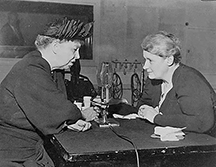 Then Mary Margaret read live copy. OR Mary Margaret had her guests read live copy. Sales for advertisers exploded. (Source: It’s One O’ Clock, Time for Mary Margaret McBride by Susan Ware https://a.co/d/iHShiad)
Then Mary Margaret read live copy. OR Mary Margaret had her guests read live copy. Sales for advertisers exploded. (Source: It’s One O’ Clock, Time for Mary Margaret McBride by Susan Ware https://a.co/d/iHShiad)


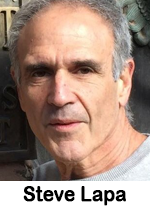 It’s that time of year. College graduates are pushing out resumes. Are you open for entry level sellers? Any turnover on your sales team this year?
It’s that time of year. College graduates are pushing out resumes. Are you open for entry level sellers? Any turnover on your sales team this year? Last week I had the privilege of moderating a panel at the TALKERS conference. Confession: I listen to speech patterns and tones more than words.
Last week I had the privilege of moderating a panel at the TALKERS conference. Confession: I listen to speech patterns and tones more than words. Michael Harrison, founder and publisher of TALKERS, and the man who invented the term AOR – let’s not forget – strongly requested that I share this story about a remarkable event we experienced. Michael describes it as the “greatest promotion” he ever witnessed at a non-commercial function involving broadcasters… so I really have no choice but to accommodate him.
Michael Harrison, founder and publisher of TALKERS, and the man who invented the term AOR – let’s not forget – strongly requested that I share this story about a remarkable event we experienced. Michael describes it as the “greatest promotion” he ever witnessed at a non-commercial function involving broadcasters… so I really have no choice but to accommodate him.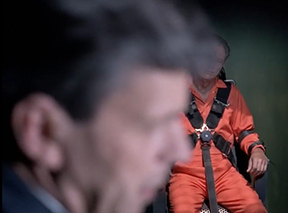 biography. I wrote him a letter inviting him to fly to New York to perform the scene live at our anniversary lunch at the National Arts Club. Two appealing prospects: Manhattan and the famous Club on Gramercy Park. Shockingly, he actually called and said if I would also fly his girlfriend in, he would do it! HE WOULD DO IT. Crap, now I had to do everything else. Invite all 200 wedding guests, stage a show, and not tell anyone that it was going to happen. Katie did not know.
biography. I wrote him a letter inviting him to fly to New York to perform the scene live at our anniversary lunch at the National Arts Club. Two appealing prospects: Manhattan and the famous Club on Gramercy Park. Shockingly, he actually called and said if I would also fly his girlfriend in, he would do it! HE WOULD DO IT. Crap, now I had to do everything else. Invite all 200 wedding guests, stage a show, and not tell anyone that it was going to happen. Katie did not know. A beautiful night. Paul Galvin and William Lear took their girlfriends to a romantic look-out view. Paul asked, “Isn’t this great?” His girlfriend replied, “It would better if we could hear music.”
A beautiful night. Paul Galvin and William Lear took their girlfriends to a romantic look-out view. Paul asked, “Isn’t this great?” His girlfriend replied, “It would better if we could hear music.” You’d be joining a dynamic and high-achieving team that likes to play as much as they win.
You’d be joining a dynamic and high-achieving team that likes to play as much as they win. 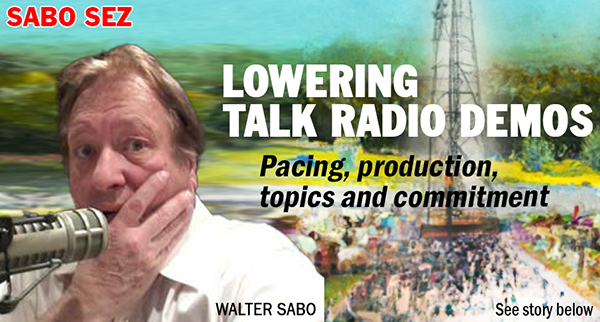
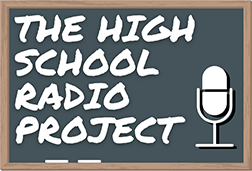 HSRP brings real-world radio skills to high school media students in each state, allowing students to curate and schedule music, record radio breaks, produce news and sports stories, interviews, and PSAs, all aired on a streaming radio station heard around the world, 24-hours a day on HighSchoolRadioProject.org, Live365, and Amazon Alexa.” They have recruited industry vendors to assist the students in their radio projects, allowing them to
HSRP brings real-world radio skills to high school media students in each state, allowing students to curate and schedule music, record radio breaks, produce news and sports stories, interviews, and PSAs, all aired on a streaming radio station heard around the world, 24-hours a day on HighSchoolRadioProject.org, Live365, and Amazon Alexa.” They have recruited industry vendors to assist the students in their radio projects, allowing them to  Notwithstanding the enormity of accomplishments that enveloped this exceptionally bright and learned broadcaster, Jerry Springer remained as humble and refreshingly an “ah shucks” individual as you’ll ever hope to meet.
Notwithstanding the enormity of accomplishments that enveloped this exceptionally bright and learned broadcaster, Jerry Springer remained as humble and refreshingly an “ah shucks” individual as you’ll ever hope to meet. The decision to change WABC from music to talk back in 1982 was not made by corporate, it was made by its then-program director, Jay Clark. Corporate was hoping he would approve the change, “they” lobbied for it, but the call was the ultimate responsibility of the program director. The business plan for WABC as a talk station predicted it to be profitable in year 10. (That’s because KABC, Los Angeles took 10 years to turn a profit.) As it turned out, WABC turned a profit in year 11.
The decision to change WABC from music to talk back in 1982 was not made by corporate, it was made by its then-program director, Jay Clark. Corporate was hoping he would approve the change, “they” lobbied for it, but the call was the ultimate responsibility of the program director. The business plan for WABC as a talk station predicted it to be profitable in year 10. (That’s because KABC, Los Angeles took 10 years to turn a profit.) As it turned out, WABC turned a profit in year 11. The whining is non-stop. Many in radio mourn the advent of consolidation, corporate dictates, staff cuts. They miss the way the industry was – before.
The whining is non-stop. Many in radio mourn the advent of consolidation, corporate dictates, staff cuts. They miss the way the industry was – before. A shocking number of highly qualified broadcasters have lost their jobs. The venture capitalists that financed the big radio companies are the people who should be fired, but that’s the next column. Let’s get you a job.
A shocking number of highly qualified broadcasters have lost their jobs. The venture capitalists that financed the big radio companies are the people who should be fired, but that’s the next column. Let’s get you a job. For 80 years – KICD-AM has been the “local information source” for northwest Iowa and portions of southwest Minnesota. Here’s what they tell TALKERS: We’re looking for someone with the ability, talent and passion to continue KICD’s long tradition into the future. The person for this position will need to live in Spencer, Iowa (or surrounding area). We need someone who understands small-market, local radio and is willing to be involved in the community. Knowledge of radio automation software, Adobe Audition and general computer experience is preferred. This person should also have previous experience on-air; production/imaging creativity; and website/social media skills. The Spencer Radio Group is owned and operated by Saga Communications – a company that invests back into their stations and their people! SRG offers great benefits including – health, vision, dental and 401K. Send your resume and demo to operations manager Kevin Tlam at
For 80 years – KICD-AM has been the “local information source” for northwest Iowa and portions of southwest Minnesota. Here’s what they tell TALKERS: We’re looking for someone with the ability, talent and passion to continue KICD’s long tradition into the future. The person for this position will need to live in Spencer, Iowa (or surrounding area). We need someone who understands small-market, local radio and is willing to be involved in the community. Knowledge of radio automation software, Adobe Audition and general computer experience is preferred. This person should also have previous experience on-air; production/imaging creativity; and website/social media skills. The Spencer Radio Group is owned and operated by Saga Communications – a company that invests back into their stations and their people! SRG offers great benefits including – health, vision, dental and 401K. Send your resume and demo to operations manager Kevin Tlam at 